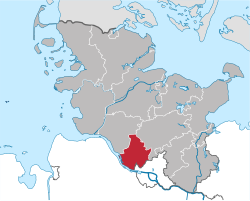Pinneberg (district)
| Pinneberg | |||
|---|---|---|---|
| District | |||
|
|||
 |
|||
| Country |
|
||
| State | Schleswig-Holstein | ||
| Capital | Pinneberg | ||
| Area | |||
| • Total | 664 km2 (256 sq mi) | ||
| Population (31 December 2015) | |||
| • Total | 307,471 | ||
| • Density | 460/km2 (1,200/sq mi) | ||
| Time zone | CET (UTC+1) | ||
| • Summer (DST) | CEST (UTC+2) | ||
| Vehicle registration | PI | ||
| Website | kreis-pinneberg.de | ||
Pinneberg is a district in Schleswig-Holstein, Germany. It is bounded by (from the northwest and clockwise) the districts of Steinburg and Segeberg, the city (and state) of Hamburg and the state of Lower Saxony (district Stade). The island of Heligoland is also part of the district.
The district is roughly identical to the former county of Holstein-Pinneberg. It was established by the Prussian administration in 1867. Since then there has been a continuous loss of territory to the neighbouring cities of Altona (later itself a part of Hamburg), Hamburg and Norderstedt. The island of Heligoland, formerly a district by itself, joined the district in 1932.
The district is situated on the northern bank of the Elbe River. While Pinneberg is the smallest district within Schleswig-Holstein, it has the most inhabitants. Due to the growing Hamburg metropolitan area the population is still increasing. The district consists mainly of the northwestern suburbs of Hamburg. Although the district of Pinneberg has no access to the sea, the islet of Heligoland became a part of this district in 1932.
Coordinates: 53°45′N 9°45′E / 53.75°N 9.75°E
...
Wikipedia


